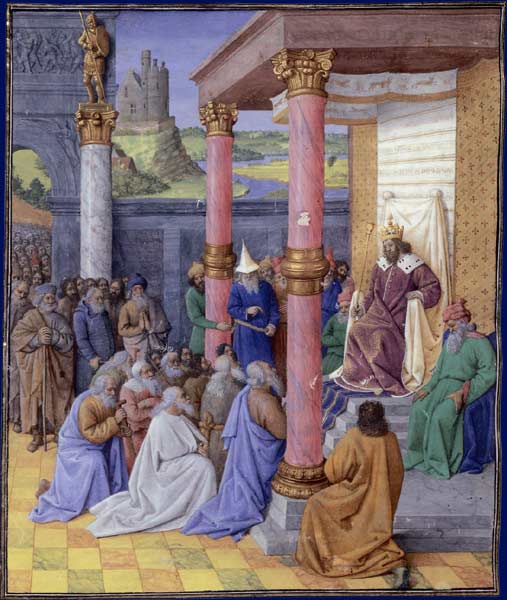
Depiction of Cyrus the Great by Jean Fouquet, 1470.
It is always fascinating when we read about or encounter someone who unexpectedly does something seemingly out of character, or obliterates our preconceived notions and judgements. The Gospels are resplendent with such examples with such unlikely characters as Levi the tax-collector who becomes Matthew, the beloved apostle; Mary Magdalene, the worldly prostitute, turned contemplative who chooses the better part; and the murderous Saul, who becomes the spirit-filled Paul. Perhaps no one causes me more pause than King Cyrus of Persia who we read about today in our First Reading from Ezra which recounts how this seeming enemy of the Jewish people during their exile in Babylon, is the very instrument through which God restores the Jewish Temple in Jerusalem.
In the first year of Cyrus, king of Persia,
in order to fulfill the word of the LORD spoken by Jeremiah,
the LORD inspired King Cyrus of Persia
to issue this proclamation throughout his kingdom,
both by word of mouth and in writing:
"Thus says Cyrus, king of Persia:
'All the kingdoms of the earth
the LORD, the God of heaven, has given to me,
and he has also charged me to build him a house in Jerusalem,
which is in Judah.
Therefore, whoever among you belongs to any part of his people,
let him go up, and may his God be with him!
Let everyone who has survived, in whatever place he may have dwelt,
be assisted by the people of that place
with silver, gold, goods, and cattle,
together with free-will offerings
for the house of God in Jerusalem."
So profound was the Jewish sense of gratitude towards this unexpected liberator, that they refer to him as King Cyrus the Great. His generosity and willingness to not only decree this, but to provide for the needs of the Temple with precious stones and raw materials gives one even more pause.
I have been pondering a variety of headlines and little vignettes I have recently read or been informed of through my teenaged children about well-known celebrities and world leaders, and some unlikely comments that they have made. One pop star has publically stated that she is getting back to her Catholic roots and praying her Rosary diligently since chronic pain has debilitated her skyrocketing career. Another pop star known to have been battling an addiction to weed has been communicating with fans that he needs a break from touring so that he can concentrate on his spiritual awakening. Some political leaders speaking tough political rhetoric one moment have then professed their love for Our Lord and Our Lady the next. Although certainly not liberating an entire people, these are individuals who can profoundly impact and influence others. At first glance, these individuals may have displayed behaviors quite contrary to the Gospel, and may continue to do so, but with some moments of grace they begin to make choices that indicate another side and reveal God within.
On a more personal level, it is sometimes those in my life with whom my spirit bristles that are sometimes the very ones who serve as unexpected messengers of God. You know, the person that drives you crazy with their incessant complaining or whom you feel no natural affinity. The individual who does not look like you, is outside your social and/or educational circle, or speaks in a brisk or abrupt manner. These are the very ones who ofttimes bring the very message that God intends for my soul. Like the time when a young man who was working at a property I was managing began to cry after explaining how he had been in prison and separated from his twin children for a year. Behind his expletive-laced speech, and plentiful tattoos, I saw a soul pining for love...Love of God and of family. At a time when my life was not balanced and work was dominating my waking moments, he voiced God's call back to what was important. As unlikely as it may have seemed, this ex-con was the voice of God in that moment. That is why we absolutely cannot judge another, and we must keep our eyes, ears, and hearts open for the inspirations of the Holy Spirit that may very well come in unexpected ways. As St. Teresa of Avila reminds us, "For the love of God, keep free from partialities however holy they may be. They are like poison."
The Jews could have held King Cyrus in suspicion and not interacted with him. They could have rebelled or been close-hearted. Instead, they received words of freedom from a most unlikely source. Let us allow God to use each person and situation as a call to holiness, and an invitation to build a little oratory or temple within our hearts. By seeing each human being as equally loved and of equal dignity before God, we can harness the grace needed to exercise unconditional love over time. We can hear the still small voice of God in the most unlikely of places and from the most unusual people.


